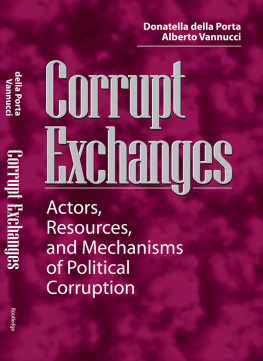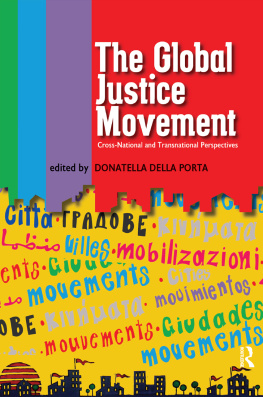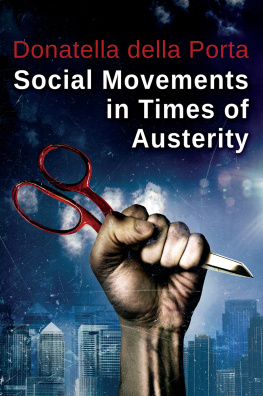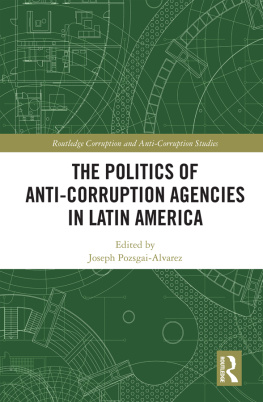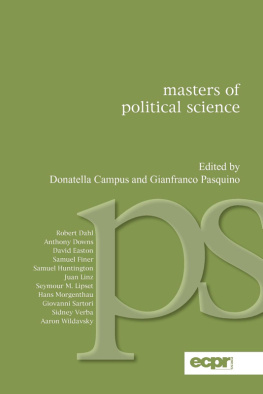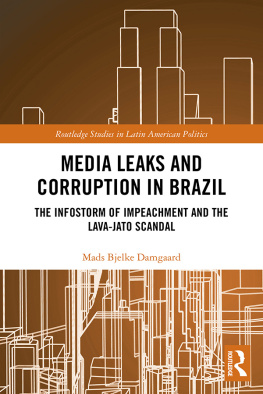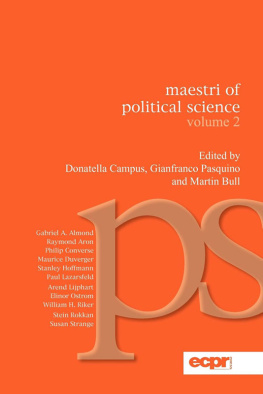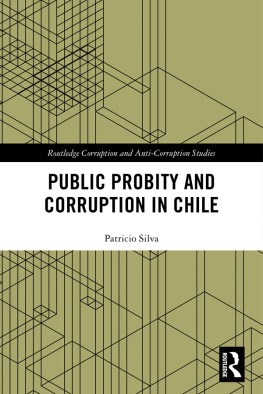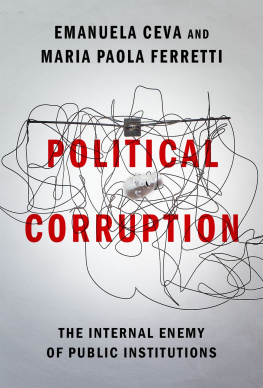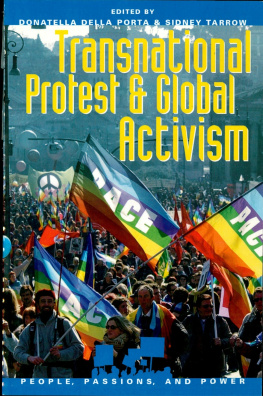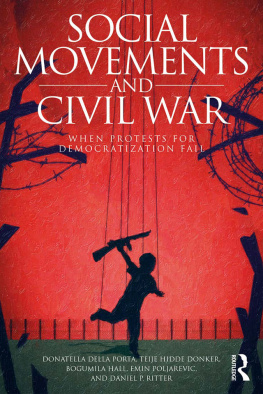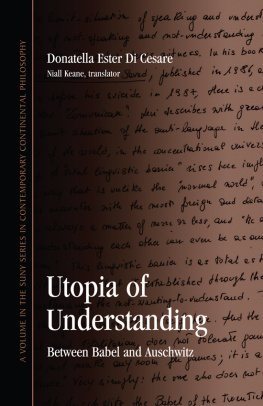Corrupt Exchanges
Donnatella della Porta
Alberto Vannucci
Corrupt
Exchanges
Actors,
Resources,
and Mechanisms
of Political
Corruption
First published 1999 by Transaction Publishers
Published 2017 by Routledge
2 Park Square, Milton Park, Abingdon, Oxon 0X14 4RN
711 Third Avenue, New York, NY 10017, USA
Routledge is an imprint of the Taylor & Francis Group, an informa business
All rights reserved. No part of this book may be reprinted or reproduced or utilised in any form or by any electronic, mechanical, or other means, now known or hereafter invented, including photocopying and recording, or in any information storage or retrieval system, without permission in writing from the publishers.
Notice:
Product or corporate names may be trademarks or registered trademarks, and are used only for identification and explanation without intent to infringe.
Library of Congress Catalog Number: 2012013859
Library of Congress Cataloging-in-Publication Data
Della Porta, Donatella, 1956-
Corrupt exchanges : actors, resources, and mechanisms of political corruption / Donatella della Porta and Alberto Vannucci.
p. cm.
1. Political corruption. 2. Political corruptionItaly. I. Vannucci, Alberto. II. Title.
JF1081.D45 2012
364.1323dc23
2012013859
ISBN 13: 978-0-202-30600-1 (pbk)
To Alessandro Pizzorno,
who inspired our research
"Bribe it," Yossarian said.
"Bribe it!" Milo was outraged and almost lost his balance and broke his neck again. "Shame on you!" he scolded severely, breathing virtuous fire down and upward into his rusty mustache through his billowing nostrils and prim lips "Bribery is against the law, and you know it. But it's not against the law to make a profit, is it? So it can't be against the law for me to bribe someone in order to make a fair profit, can it? No, of course not!" He fell to brooding again with a meek, almost a pitiable distress. "But how will I know who to bribe?"
"Oh, don't you worry about that," Yossarian comforted him with a toneless snicker as the engines of the jeeps and ambulance fractured the drowsy silence and the vehicles in the rear began driving away backward. "You make the bribe big enough and they'll find you. Just make sure you do everything right out in the open. Let everyone know exactly what you want and how much you're willing to pay for it. The first time you act guilty or ashamed, you may get into trouble. "
Joseph Heller, Catch 22, London, Corgy Books, 1964, p. 283
Acknowledgments
This book reports on three different pieces of research: the first research was conducted by Donatella della Porta at the European University Institute in Florence; the second constitutes Alberto Vannucci's Ph.D. and post Ph.D. research at the faculty of Political Science of the University of Pisa; and the third was led jointly by the two authors under the sponsorship of the Consiglio Nazionale delle Ricerche, under the Special Program on the Public Administration. Donatella della Porta worked on the final revisions of the book during a sabbatical year at the Wissenschaftszentrum in Berlin with a grant from the Alexander von Humboldt Stiftung. We wish to thank all these institutions for their logistic support, and our colleagues and mentors Sabino Cassese, Raimondo Cubeddu and Alessandro Pizzorno for their scientific advice.
Some results of our research have been discussed at the following meetings: the Joint Sessions of European Consortium for Political Research in Leiden (April 1993); the conference on "Illegalit-legalit e ceti emergenti nel cambiamento delle societ europee" organized by the Istituto di sociologia internazionale in Gorizia (October 1993); the international conference on "Corruption and Democracy" at the Observatoire du Changement Social en Europe Occidentale in Poitier (November 1993); the Conference on "Tangentopoli e la crisi del sistema politico italiano," organized by the Robert Schuman Center at the European University Institute in Florence (January 1994); the Conference on "Reconstituting Italy: Sources of Pathology and Forces for Reform," at the Center for European Studies at Harvard University (February 1994); the workshop on "La crisi dei partiti in Italia," organized by the Istituto Gramsci of Turin (May 1994); the Annual meeting of the Association for the Study of Modern Italy (London, November 1994); the International Conference on "Democracies between Crisis and Reform. Comparing Italy and Belgium" held in Brussels (September 1995); the International workshop on "Political Corruption" in Nottingham (May 1996); the International Conference on "Political Corruption" at the University of Salford (November 1996); the International Conference on "Political Corruption in Western Europe: Austria, Belgium, Italy and Franco Compared" in Brussels (December 1997); the Joint Sessions of the European Consortium for Political Research in Warwick (March 1998); the International Conference on "Public Trust and Governance in the Trilateral Democracies" in the Bellagio Study and Conference Center of the Rock- feller Foundation (June 1998). We are grateful to our colleagues who organized and participated in those occasionsamong them, Arnaldo Bag- nasco, Jean Cartier-Bressons, Martin Bull, Giacomo Costa, Arnold Heidenheimer, Paul Heywood, David Hine, Francesco Kijllberg, Jean- Francois Medard, Henri Mendras, Yves Meny, Leonardo Morlino, James Newal, Susan Pharr, Bob Putnam, Vincent Wright, Lieven de Winterfor very stimulating discussions.
The authors are obliged to all those who helped them collect the thousands and thousands of pages, mainly judicial materials, on which much of their research is based. Among the judges who helped us, special thanks go to Gherardo Colombo, Michele Del Gaudio, Antonio Di Pietro, Pier- camillo Davigo, Filippo Grisolia, Francesco Greco, Fausto Izzo, Giovanni Leonardi, Guido Lo Forte, Leonardo Guarnotta, Marco Maria Maiga, Rosario Minna, Fabio Napoleone, Guido Papalia, Vittorio Paraggio, Luca Pistorelli and Ottavio Sferlazza. For her help in the collection of parliamentary sources we are grateful to Dottoressa Emilia Lamaro. Moreover, we are profoundly indebted to the dozens of interviewees who trusted us not only with their time, but also with their confidence.
This work derives from a constantfruitful and friendlycollaboration between the two authors. Alberto Vannucci has collected and excerpted most of the judicial materials; Donatella della Porta has run the case studies of three Italian cities, mainly based on in-depth interviews. In a long (almost endless) procedure, all the chapters have gone back and forward from Florence to Pisa and vice-versa, until both authors were satisfied with the results. For the record, Donatella della Porta has produced the final version of , 8. The conclusion was jointly written. John Donaldson translated the whole manuscript with competence and care. Richard Koffler at Aldine de Gruyter gave good advice (not only linguistic) about the translation of our Italian production for an international public. We hope it was worthwhile.
Contents
1
The Market for Corrupt Exchange:
An Introduction
When Bettino Craxi rose to speak in the Chamber of Deputies on July 3, 1992, he was a political leader in grave difficulty. And yet immediately after the elections of April 7, Craxi, leader of the Italian Socialist Party (Partito Socialista Italiano, PSI) since 1976 and prime minister of the longest-lived government in Italy's postwar historyfrom 1983 to 1987had appeared set for a return to the premiership. He was backed by a political alliance known as the CAP, after the initials of its leading exponents (Craxi himself, outgoing premier Giulio Andreotti, and the party secretary of the Christian Democrats, Arnaldo Forlani). The CAP, however, turned out to be a failure, achieving not one of its objectives. To understand why, it is necessary to take a short step back in time, to February 17,1992. In Milan, Mario Chiesa, Socialist city councillor and president of a municipal home for the elderly, the Pio Albergo Trivulzio, was arrested while accepting a small bribe. The man responsible for the arrest was Antonio Di Pietro, the Milanese assistant prosecutor who would later become a national hero. Thirty-five days later, Chiesa began to collaborate with the magistrates, setting off a chain of confessions that resulted, shortly after the election, in indictments against a great many businessmen, bureaucrats, and politicians, all of them closely associated with the country's ruling political elite. As a result of the massive wave of popular indignation produced by the scandal, Forlani was unsuccessful in his bid to be elected president of the republic (one of the objectives behind the CAP) and the new president, Oscar Luigi Scalfaro, was persuaded not to offer Craxi the premiership. In the meantime the


